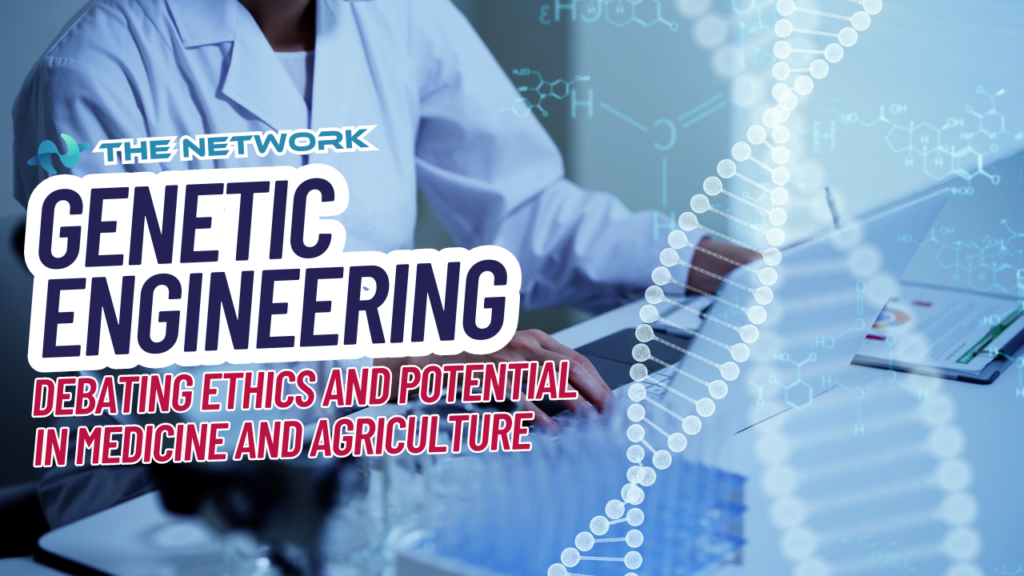Genetic Engineering: Debating Ethics and Potential in Medicine and Agriculture

Genetic engineering, a groundbreaking field in science, involves altering the DNA of organisms, including plants, animals, and humans. This manipulation allows scientists to enhance or modify the characteristics of these organisms. The process is akin to a meticulous edit of a complex code, leading to desired traits or functions.
The Potential of Genetic Engineering
- Medical Breakthroughs: Genetic engineering has revolutionized medicine. For instance, gene therapy treats inherited disorders by replacing defective genes. The production of insulin, previously extracted from animals, is now more efficient through genetically modified bacteria.
- Increased Crop Productivity: In agriculture, genetic engineering leads to crops with higher yields, resistance to pests and diseases, and adaptability to harsh weather conditions. An example is the creation of BT cotton, which is inherently pest-resistant.
- Environmental Sustainability: Genetically modified crops require fewer chemical pesticides, reducing environmental pollution. Engineering crops to fix nitrogen directly from the air could potentially reduce the need for chemical fertilizers, further aiding in environmental conservation.
What is Genetic Manipulation?
Development and Uses: Genetic manipulation has evolved from basic genetic studies to sophisticated CRISPR technology. Its uses span from creating drought-resistant crops to developing treatments for genetic diseases.
Advantages and Disadvantages: The primary advantage is the potential to solve critical problems in health and agriculture. However, disadvantages include ethical concerns, potential harm to natural ecosystems, and the unknown long-term effects of genetically modified organisms (GMOs).
Brief History: The history of genetic engineering dates back to the 1970s with the development of recombinant DNA technology. Since then, the field has seen rapid advancements.
Ethical Considerations and Responsibilities
Ethical considerations in genetic engineering are paramount. These include respecting the natural order of life, considering the long-term effects on ecosystems, and addressing concerns about ‘playing God’.
The Role of Ethical Guidelines
Organizations like WHO, UNESCO, and National Academies of Sciences have established guidelines to ensure responsible research in genetic engineering. These guidelines emphasize safety, ethical considerations, and societal impacts.
The Bioethical Dilemma
- Unintended Consequences: Manipulating genes may have unpredictable outcomes.
- Unpredictable Side Effects: Long-term effects on health and the environment are still largely unknown.
- Equitable Access: There’s a risk of creating a disparity between those who can and cannot afford these technologies.
- Improved Agriculture vs. Biodiversity Loss: While engineered crops can be more productive, they may also lead to a loss in biodiversity.
- Human Enhancement: Ethical concerns arise regarding the enhancement of human abilities through genetic engineering.
A Balanced Approach for the Future
A balanced approach would involve stringent regulatory measures, continuous monitoring of impacts, and open public dialogues to address concerns and ethical implications.
The Role of Government and Regulatory Bodies
Governments and regulatory bodies play a crucial role in overseeing the development and application of genetic engineering, ensuring safety, ethical adherence, and public interest protection.
School or Homeschool Learning Ideas
- CRISPR Controversy – Explore the ethical dilemmas surrounding CRISPR gene editing technology, using examples like the controversial case of He Jiankui’s gene-edited babies in China to spark discussion on the implications of genetic engineering in humans.
- GMO Grand Debate – Delve into the debate over genetically modified organisms (GMOs) in agriculture, with examples like the use of genetically engineered crops by companies like Monsanto and the concerns raised by environmental and consumer advocacy groups.
- Designer Babies Drama – Examine the concept of “designer babies” and the ethical implications of selecting traits through genetic modification, referencing examples like the potential use of gene editing to prevent genetic diseases or enhance physical and cognitive traits.
- Bioethics Battle – Discuss the role of bioethics in guiding genetic engineering practices, using examples like the ethical guidelines established by organizations such as the National Academy of Sciences to regulate research and applications in genetic engineering.
- Regulatory Rumble – Explore the regulatory landscape of genetic engineering in medicine and agriculture, referencing examples like the FDA’s approval process for genetically modified foods or the debate over regulating human gene editing techniques to ensure safety and ethical use.
What Our Children Need to Know
- The Difference Between GMOs and Natural Organisms: Understanding how GMOs are created and their differences from natural organisms.
- The Role of Ethics in Science: Recognizing the importance of ethical considerations in scientific advancements.
- Global Impact of Genetic Engineering: How genetic engineering affects global agriculture, medicine, and the environment.
- The Importance of Biodiversity: Understanding the significance of maintaining biodiversity in the face of genetically modified crops.
- Future Prospects of Genetic Engineering: Exploring potential future developments and their implications.
The Big Questions
- How can we balance the benefits of genetic engineering with its ethical dilemmas?
- Will the widespread adoption of genetically modified crops lead to a loss of natural biodiversity?
- How might genetic engineering change the way we approach healthcare in the future?
- What are the long-term environmental impacts of genetically modified organisms?
- How should we regulate the use of genetic engineering to ensure fair access and ethical use?





Responses